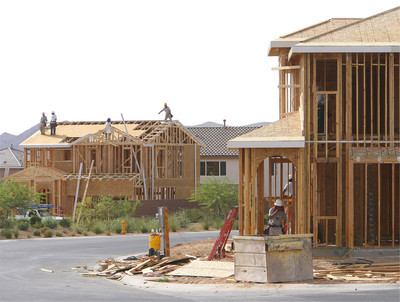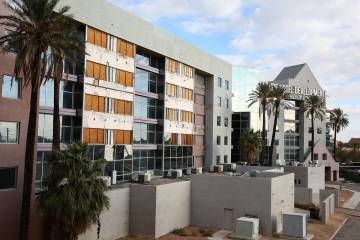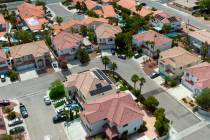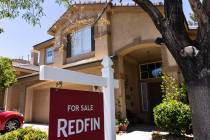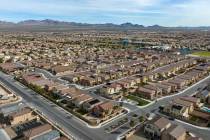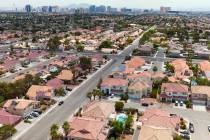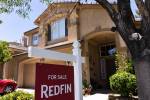Searching for bottom
With the pep talk from real estate agents contradicted by doom-and-gloom reports on the housing industry, nobody seems to really know if or when the market will begin to recover.
Consumers who have been sitting on the fence are being advised by sales agents that it's a great opportunity to buy as Las Vegas home prices have plunged 25 percent from a year ago and the average foreclosure home is selling for $190,000.
Pundits are saying you'd be a fool to buy now and watch your home value continue to free-fall for at least another year.
"The recovery is a tricky question," Realtor Steve Hawks of ReMax Platinum said. "For people who bought a home for $200,000 and their neighbor across the street owes $450,000, if you ask the homeowner who bought for $200,000, the recovery has begun. You ask the homeowner who owes $450,000, that homeowner will be giving you a much different answer.
"For most homeowners who bought after 2003, the recovery will most likely be too little and too late," he said.
The nation is still in the "early innings" of the bursting of the housing and credit bubbles, New York-based investment adviser T2 Partners Management said in a March report.
Americans' equity percentage in their homes has fallen below 50 percent for the first time since 1945, T2 Partners reported. Nearly 3 million homeowners were behind on their mortgages at the end of 2007 and another
1 million were at risk of imminent foreclosure.
"Home prices are in an unprecedented free fall," the report said. "Things are terrible and there's no sign of a bottom."
One of the most sobering implications of the great mortgage bubble is reduced borrowing power, even for qualified buyers. Assuming constant interest rates, borrowing power today has declined about 40 percent from last year, according to the report.
CNNMoney.com reported in July that the housing market was on a path to rebound, that the pain felt by homeowners and home builders is a sign that things will get better.
The fall of housing starts to their lowest level in 17 years is an "almost certain sign that the path to a housing recovery is finally in sight," CNNMoney.com said.
The new-home segment has already hit bottom and will stay there until the beginning of the new year, said Dennis Smith, president of Las Vegas-based Home Builders Research.
He counted 762 new-home sales in July, bringing the year-to-date total to 6,502, down 46.6 percent from a year ago.
"I don't see any upward trend yet in new-home sales. I think the fourth quarter will be difficult for builders," Smith said. "We'll see a pickup in the spring and then it'll be flat, the same thing as this year."
Median new-home prices declined slightly to $265,000 in July, compared with $269,900 the previous month, and probably aren't going to drop much lower, Smith said.
Existing-home sales have rebounded in Las Vegas, increasing for the seventh consecutive month to 3,169 in July, Home Builders Research reported.
"That's good news. They're moving inventory," Smith said. "Prices, however, are still going down and will continue to go down for the next three to six months. If resales continue to increase, and they should, within six months we should see prices flatten out like they have with new homes.
"Where's the bottom? It's six months away for resales," he said. "That doesn't mean rebound or turnaround. That's bottom."
Bob Wells, chief financial and operating officer of Las Vegas-based Phillips Homes, said sales have clearly turned around since January. Higher absorption is keeping resale inventory stable and home builders have cut back sharply on speculative building, he said.
"My interpretation of the data is that the Las Vegas housing market has turned up," Wells said. "It hasn't trickled down to the new-home construction market yet, but it will. Prices haven't begun rising yet because of the impact of foreclosures. They may keep prices depressed for a little longer, but we'll work our way through those better than most other markets in the country.
"That's not to say that we won't still have some ups and downs in the months ahead, but it should keep getting better, especially after the presidential election and the holidays."
Las Vegas will have added 8,789 hotel rooms by the end of this year and another 16,710 rooms in 2009, the Las Vegas Convention and Visitors Authority reports. That doesn't include some 2,500 time-share units coming on line in the next two years.
Local economists estimate that each new room generates five to six jobs, from hotel service and maintenance to food and entertainment for guests. The Department of Motor Vehicles reports 5,000 to 6,000 people a month exchanging driver's licenses from other states.
"People will come in anticipation of jobs or simply because they like it here," Wells said. "They need to live somewhere. There are not enough homes to accommodate all the move-ins over the next couple of years."
Las Vegas has seen a lot of interest lately from foreign buyers aggressively taking advantage of reduced housing prices and a stronger currency against the U.S. dollar, said Patty Kelly, president of the Greater Las Vegas Association of Realtors.
"Las Vegas is still a world-class city," she said. "Especially for Canadians, with the turnaround in the value of their dollar ... Canadians can come in and pick up something affordable."
Nationally, the 12-month depreciation rate in home prices has been hovering around 10 percent, First American CoreLogic reported in its May loan performance house price index. Some states -- notably Nevada, California, Arizona and Florida -- have experienced declines of 18 percent or more.
"We are cautiously optimistic that stabilization in the decline rate is the first indicator that house-price declines may not be getting any worse nationally," CoreLogic chief economist Mark Fleming said.
There is one obstacle looming for housing recovery, Mark McGarry of First United Mortgage said. Although sales have increased, 80 percent to 90 percent of those purchases were made with down-payment assistance that will become obsolete in October, he said.
The Federal Housing Administration has distorted the numbers, claiming that only 40 percent of FHA-insured loans use such assistance, McGarry said. He's talked to appraisers, Realtors and title company officers and they all come up with much higher figures.
"If we take this many borrowers off the market, come October our sales will be down to the same numbers as a year ago and we will jump to a 28-month supply of housing again," he said.
Las Vegas will not bottom out all at once, ReMax Platinum's Hawks said. Some areas will take longer, particularly newer communities.
"Let's not forget that builders took years to sell these homes when loans were easy and the economy was booming," he said. "Now the banks have to resell these communities with loans tight and the economy sputtering."
T2 Partners said Wall Street's demand for loan product was a major driver of the decline in lending standards. Mortgages were a quick and easy source for enormously profitable asset-backed securities and collateralized debt obligation.
"It is easy to generate higher and higher volumes of mortgage loans," T2 said in its report. "Simply lend at higher loan-to-value ratio with ultralow teaser rates to uncreditworthy borrowers and don't bother to verify their income and assets (thereby inviting fraud). There's only one problem: Don't expect to be repaid."
The recovery will come when home prices are 3.5 times the region's average household income, minus 20 percent to 25 percent correction in bear markets, Hawks said.
"The bottom is not going to be a time frame, but a price range," he said. "Two buyers will buy a home at the same time and one will buy at the bottom; the other will be $50,000 over. It's the price you pay, not the time you buy, that will determine if you make money."
Contact reporter Hubble Smith at hsmith@reviewjournal.com or 702-383-0491.
23,4000 -- Approximate number of single-family homes for sale in Las Vegas in July 2008
265,000 -- July median new-home price in Las Vegas, down from $269,900 the previous month
46.6 -- Percentage drop in new-home sales in Las Vegas from a year ago



